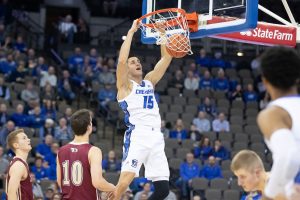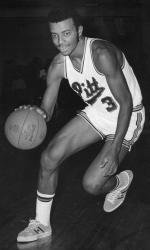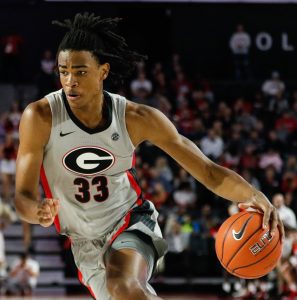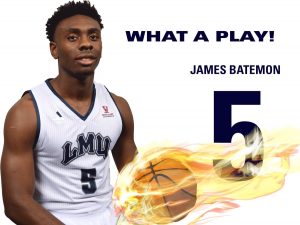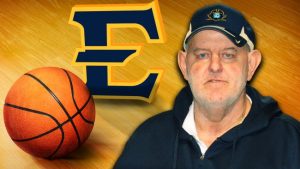There is only 1 week left for the college kids to impress the scouts before the NBA Draft takes place on June 20th. We will spend that time talking to the stars of tomorrow as they prepare for the next phases of their careers. Martin Krampelj has had a long journey to professional basketball both in terms of geography (growing up in Slovenia) as well as anatomy (a trio of ACL tears). He succeeded on both ends of the court at Creighton in terms of offense (60.2 career FG%) and defense (top-10 in Big East play last year in both BLK/STL). HoopsHD’s Jon Teitel got to chat with Martin about his academic/athletic achievements and what it would mean to get drafted.
You grew up in Slovenia: how did you 1st get into basketball, and how big is the sport in your homeland? I grew up with my 2 sisters and 3 cousins who were my neighbors. 2 of them were older and I always wanted to do what they did so when they started playing basketball then so did I a week later. Long story short: I loved it and it grew into something bigger. I think that soccer might be bigger than basketball but Slovenians love basketball. Goran Dragic, Luka Doncic, and other high-profile basketball players from Slovenia are a very big influence on kids and our country.
In 2012 you played on the Slovenian national team at the U18 Euro Championships: what did it mean to you to represent your country, and what was it like facing future lottery pick Dario Saric (who scored 27 PTS in 30 minutes during a win by Croatia)? Playing for the national team was a dream come true for me. Slovenia and Croatia are big rivals in every sport so it is always fun to play against them. I remember that Saric was just unstoppable at the time: that is why he is in the NBA now.
What made you choose Creighton, and how did you like playing for Coach Greg McDermott? Creighton offered me an official visit to the university and I fell in love with everything I saw. The fans, coaches, teammates, and all of the other people around were very nice/fun to talk to. From an educational standpoint Creighton ranks pretty high nationally. I did not even mention the facilities yet: they are absolutely on the highest level possible. With all of that I was very fortunate to be in a “small city”, which I liked because I came from a way smaller environment. Coach McDermott is a great coach who everyone would love to play for. What I really like about him is that he brings the best out of his players and gives the team a chance to be successful both on and off the court.
Last year you were the only player to rank in the top-10 in Big East play in both BLK/STL: what is your secret for being a great defender? Part of the secret was that I was kind of undersized on my position so I looked a lot faster than the guys who I was matched up with. Obviously defense at Creighton is a team effort so I was put in a position to be successful. We all helped each other and the main thing was to talk on defense, which will also help a defender be successful.
You finished your college career as a 60.2% FG shooter: what is the key to being a great shooter? I did not even realize that until now. That is not bad but it could be even better now that I think about some of my missed layups (haha!). I just think that I was very efficient in player movement/positioning that helped me score a couple of easy ones every game. Again, I could not have done it without my teammates. The whole team is basically around 40% from the 3-PT line so that puts a lot of confusion and pressure on our opponents. Those numbers come with a lot of hard work and watching a lot of film.
You were a 3-time member of the Big East All-Academic Team: how did you balance your work on the court with your work in the classroom? First of all I want to thank my professors who helped me schedule school around my basketball schedule and really helped me stay on top of everything. I never missed class and built good relationships with professors who were willing to help everyone be successful as long as we worked hard.
You have suffered 3 ACL tears during your career: how is your health doing at the moment? I have never felt better!
You stated on Twitter that you decided to go pro “after testing the waters and receiving valuable feedback”: what kind of feedback did you receive, and did the fact that you graduated last month have any impact on your decision? I liked my chances to stay in the draft. I got to compete against projected 1st round picks and had a good feeling that I could compete with them. I got my degree and now want to pursue my dream of playing in the NBA.
How do you think the Bluejays’ frontcourt will be this fall with both you/Samson Froling turning pro and Jacob Epperson continuing to rehab from injuries? We are at our best with our backs against the wall. Creighton always finds a way to win games and I am sure that it will continue next year. Christian Bishop might be only a sophomore but I think that he will step up his game because he learned a lot this past season. Jacob has not played very much (21 total games over the past 2 years) but proved that he is unstoppable so he will heal and then become a star.
What would it mean to you to get drafted, and will you head overseas if you do not get drafted? It would be my dream come true to get drafted. I have watched the NBA Draft since I was a kid…even though I had to wake up in the middle of the night to watch it! I never had all that hype and buzz from high school so I am used to proving myself again and again. I will do whatever it takes for me to become an NBA player.

